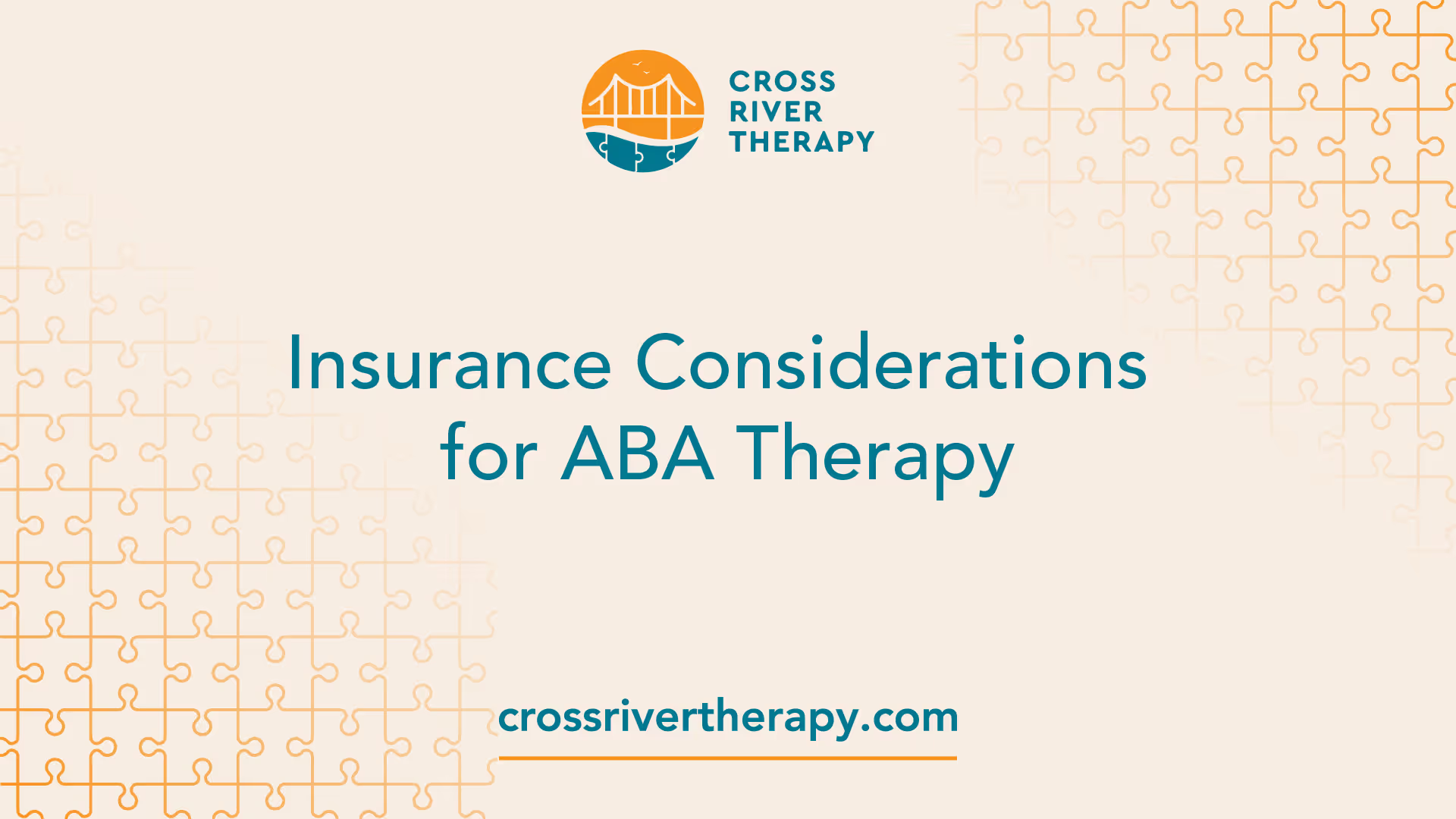Navigating Insurance for ABA Therapy
Discover eligibility criteria and state-specific guidelines for your child's needs.
Understanding ABA Therapy Coverage
When seeking ABA therapy for children with autism, understanding the coverage provided by insurance is essential. Insurance coverage for ABA therapy can vary depending on state-specific guidelines and the individual insurance plan. Let's explore the two key aspects of understanding ABA therapy coverage: state-specific guidelines and insurance coverage overview.

State-Specific Guidelines
Many state health insurance plans, including Medicaid, provide coverage for ABA therapy for children up to the age of 21. However, it's important to note that the rules and requirements for coverage may vary by state. To determine the specific guidelines for your state, it is recommended to check with your insurance provider or refer to your state-specific guidelines. For more information on state-specific guidelines for ABA therapy coverage, visit Maxim Healthcare.
Insurance Coverage Overview
Most insurance plans provide coverage for autism treatment, including ABA therapy. However, the extent of coverage can differ from state to state and plan to plan. It is crucial to review your insurance policy or contact your insurance provider to understand the specific coverage details. Additionally, you can reach out to the ABA Centers of America hotline for insurance verification. They can help you navigate the insurance process and provide guidance on coverage options. You can find more information on ABA therapy insurance coverage at ABA Centers.
It is worth noting that all 50 states have implemented some form of mandate regarding coverage for autism. However, the benefits and coverage can still vary. Families should be aware that moving to another state can significantly impact the cost of ABA therapy, so understanding the rules outlined in the insurance policies is crucial.
In recent years, there have been significant developments in insurance coverage for ABA therapy. The federal mandate now requires insurance companies in all 50 states to provide coverage for services like ABA therapy for individuals with an autism diagnosis. This mandate was adopted by every state in the U.S. by 2021, ensuring increased access to ABA therapy services. For more information on maximizing insurance coverage for autism treatment, refer to TherapyWorks and Autism Center of Excellence.
Understanding the state-specific guidelines and the coverage provided by your insurance plan is crucial for navigating the financial aspects of ABA therapy. By being well-informed, you can make informed decisions and ensure that your child receives the necessary ABA therapy services for their development and well-being.
Insurance Considerations for ABA Therapy
When it comes to accessing insurance coverage for ABA therapy, there are important considerations to keep in mind. Understanding the eligibility criteria and diagnosis requirements can help parents navigate the process and ensure that their child receives the necessary treatment.

Eligibility Criteria
Insurance coverage for ABA therapy may have specific eligibility criteria that need to be met. Most insurance companies only cover ABA therapy with an autism diagnosis. Some insurance carriers may require a letter from your child's treating physician, stating why ABA therapy is medically necessary. It's essential to familiarize yourself with your insurance policy's requirements to determine if your child meets the necessary criteria for coverage.
Additionally, coverage for ABA therapy may vary based on your location and plan. Some insurance companies can cover autism testing, but the extent of coverage will depend on your specific insurance policy and location [1]. It's important to contact your insurance provider or review your policy documents to understand the specific coverage details.
Diagnosis Requirement
A federal mandate now requires insurance companies in all 50 U.S. states to provide coverage for ABA therapy for individuals with an autism diagnosis. This mandate has been adopted by every state in the U.S. by 2021. However, it's important to note that coverage may still vary depending on your insurance type and the state of residence.
To access insurance coverage for ABA therapy, your child will need an autism diagnosis. It's crucial to consult with a healthcare professional who specializes in autism to obtain a comprehensive evaluation and diagnosis. A board-certified behavior analyst (BCBA) typically provides ABA therapy services, along with therapists or registered behavior technicians (RBTs) who are trained and supervised by the BCBA.
By understanding the eligibility criteria and diagnosis requirements for insurance coverage, parents can navigate the process more effectively. It's recommended to review your insurance policy's coverage details and consult with your insurance provider to ensure that you meet the necessary criteria and understand the extent of coverage for ABA therapy.
Variability in Insurance Coverage
When it comes to insurance coverage for ABA therapy, it's important to recognize that there can be significant variability from state to state and even within different insurance plans. Understanding these variations is crucial for parents of children diagnosed with autism who are seeking ABA therapy for their child.

State-to-State Variations
Coverage for ABA therapy can vary from state to state, and it's essential to be aware of the specific guidelines and regulations in your state. While all 50 states have some kind of mandate regarding coverage for autism, the benefits provided can differ significantly [4]. Some states have specific autism mandates outlining details such as age groups covered, annual spending caps, and limits on the number of visits [2].
For families who may be relocating, it's important to understand that moving to another state can impact the cost of ABA therapy. Familiarize yourself with the rules outlined in the policies of insurance plans in the new state to ensure continuity of coverage and avoid any surprises [1].
Plan-Specific Differences
In addition to state-to-state variations, insurance coverage for ABA therapy can also differ within different insurance plans. Some insurance companies are quick to cover ABA therapy, while others may be more conservative in their coverage. Familiarize yourself with the specific details of your insurance plan, including any limitations or requirements for ABA therapy coverage.
It's worth noting that a federal mandate now requires insurance companies in all 50 states to provide coverage for services like ABA therapy for individuals with an autism diagnosis. This mandate was adopted by every state in the U.S. by 2021, ensuring broader access to ABA therapy [2]. However, the specific coverage details and limitations can still vary from plan to plan.
To navigate the variability in insurance coverage, it's important to review the coverage details of your specific insurance plan. Familiarize yourself with the terms and conditions, including any requirements for pre-authorization or referrals. If you have any questions or need clarification, don't hesitate to contact your insurance provider directly.
If you're unsure about the coverage or find it challenging to navigate the insurance landscape, insurance verification services can be a valuable resource. These services can help you understand your coverage, verify the benefits for ABA therapy, and guide you through the process of obtaining the necessary authorizations.
Understanding the state-to-state variations and plan-specific differences in insurance coverage for ABA therapy is crucial for parents seeking this essential therapy for their children. By familiarizing yourself with the specific guidelines and regulations, you can better advocate for your child's needs and ensure they receive the necessary ABA therapy to support their development.
Navigating Insurance Policies
When it comes to securing insurance coverage for ABA therapy, navigating through insurance policies can be a challenging task for parents of children diagnosed with autism. Understanding the coverage details and requirements is key to ensuring that your child receives the necessary treatment. In this section, we will explore two important aspects of navigating insurance policies for ABA therapy: reviewing coverage details and utilizing insurance verification services.
Reviewing Coverage Details
Each insurance plan comes with a booklet that outlines the coverage details, including the benefits and limitations of ABA therapy. It is crucial for parents to thoroughly review this information to understand what is covered and what may require additional documentation or approval. Some insurance companies are quick to cover ABA therapy, while others may require more information before approving the treatment.
Most insurance companies only cover ABA therapy with an autism diagnosis. Some may also require a letter from your child's treating physician, stating the medical necessity of ABA therapy. By familiarizing yourself with the coverage details, you can better advocate for your child's needs and ensure that you have all the necessary documentation to support your claim.
It is also important to note that a federal mandate now requires insurance companies in all 50 U.S. states to provide coverage for ABA therapy for individuals with an autism diagnosis. However, specific coverage details may still vary, so it is essential to review your policy thoroughly.
Insurance Verification Services
To ease the process of navigating insurance policies, many ABA therapy providers offer insurance verification services. These services involve working with the insurance company directly to verify coverage, determine any pre-authorization requirements, and gather the necessary documentation for ABA therapy services. This can save parents valuable time and alleviate some of the stress associated with understanding complex insurance policies.
Utilizing insurance verification services allows ABA therapy providers to handle the administrative aspects of insurance coverage, ensuring that all necessary steps are taken to secure approval for treatment. They can assist in obtaining any required letters or documentation from healthcare professionals to support the medical necessity of ABA therapy.
By taking advantage of these services, parents can focus on their child's well-being and receive the support they need in navigating the insurance process. It is important to inquire about insurance verification services when selecting an ABA therapy provider to ensure a smooth and efficient experience.
Navigating insurance policies for ABA therapy can be complex, but understanding the coverage details and utilizing insurance verification services can help streamline the process. By reviewing the coverage details provided in your insurance plan booklet and seeking assistance from ABA therapy providers, you can advocate for your child's needs and ensure they receive the necessary treatment. Remember, families have the right to appeal if coverage for ABA services is initially denied by the insurance provider.
Cost of ABA Therapy
When considering ABA therapy for a child with autism, one crucial aspect that parents need to take into account is the cost. The expenses associated with ABA therapy can vary based on several factors, including the location, intensity of therapy, and insurance coverage. In this section, we will explore the cost of ABA therapy both with and without insurance coverage.
Cost Without Insurance Coverage
Without insurance coverage, the cost of ABA therapy can be substantial. Costs can vary depending on the number of therapy hours required and the duration of treatment. On average, ABA therapy can range from $17,000 to $45,000 per year, with some individuals potentially paying up to $100,000 annually. Therapy sessions can typically span 20-40 hours per week and may continue for multiple years.
To provide a more comprehensive picture, let's break down the costs further. According to Cross River Therapy, ABA therapy costs can range from $62,400 to $249,600 per year without insurance coverage. On a monthly basis, costs can vary from $4,800 to over $20,000. For weekly sessions, the cost can start at $1,200 and go up to $4,800.
Cost Savings with Insurance
Thankfully, insurance coverage can significantly reduce the financial burden associated with ABA therapy. Medicaid and private insurance plans typically cover ABA therapy sessions across all 50 states in the U.S., offering a maximum value assistance of $36,000 for autism therapy, including habilitation or rehabilitation methods [6]. Insurance coverage can vary depending on the specific plan, so it's important to review the details of your policy to understand the extent of coverage.
With insurance, the out-of-pocket expenses for ABA therapy are typically significantly reduced. The exact amount will depend on your insurance plan, deductible, and co-payments. It's crucial to review your coverage details and consult with your insurance provider to understand the specific costs and coverage limits associated with ABA therapy.
By utilizing insurance coverage, parents can access much-needed assistance in managing the costs of ABA therapy. It's important to explore the available options and understand the coverage provided by your insurance plan. This way, you can make informed decisions about the best course of action for your child's therapy while considering the associated financial implications.
Benefits of ABA Therapy
ABA therapy, or Applied Behavior Analysis therapy, is considered one of the most effective treatments for individuals with autism spectrum disorder (ASD). This evidence-based therapy focuses on teaching and reinforcing positive behaviors while reducing challenging behaviors. Let's explore the benefits of ABA therapy, including its effectiveness and long-term positive results.
Therapy Effectiveness
Multiple studies have demonstrated the effectiveness of ABA therapy in improving various aspects of an individual's life. A 2011 review examining 27 studies found that children who received ABA therapy experienced improvements in cognitive abilities, language, adaptive behavior, and social skills. Another study conducted in 2007 indicated that children who received ABA therapy early on made more sustained gains in cognition, academics, adaptive behaviors, social behaviors, and language compared to children in control groups.
Furthermore, research shows that starting ABA therapy early can lead to significant improvements. A study conducted in 2012 found that toddlers with autism who received 6 months of ABA therapy starting around 2 years old showed improvements in their ability to communicate with others and a reduction in the severity of their autism symptoms. ABA therapy is also effective for individuals of all ages, not just young children.
Long-Term Positive Results
While ABA therapy does not cure autism, it can help manage many of the associated symptoms and improve an individual's quality of life. The positive effects of ABA therapy can extend well into the future. The Surgeon General's autism treatment report states that ABA therapy accounts for 45% of therapies that develop long-lasting and observable results for individuals with ASD [7].
By focusing on teaching individuals new skills and reducing challenging behaviors, ABA therapy can help individuals with autism lead more independent lives. The skills learned through ABA therapy, such as communication, social interaction, and daily living skills, can contribute to improved overall functioning and participation in various environments, including school, home, and community settings. ABA therapy provides individuals with the tools they need to navigate the challenges they may face throughout their lives.
It's important to note that each individual's response to ABA therapy may vary, and the duration and intensity of therapy may depend on the specific needs and goals of the individual. Consulting with a qualified ABA therapist or professional can help determine the most appropriate treatment plan for your child.
In conclusion, ABA therapy offers significant benefits for individuals with autism. Its proven effectiveness in improving cognitive abilities, language, adaptive behavior, and social skills makes it a valuable treatment option. The long-term positive results of ABA therapy can enhance an individual's overall functioning and independence, contributing to a better quality of life for individuals with autism.
References
[1]: https://www.crossrivertherapy.com/insurance
[2]: https://therapyworks.com/blog/autism/
[3]: https://www.autismspeaks.org/applied-behavior-analysis
[4]: https://www.abacenters.com/does-insurance-cover-aba-therapy/
[5]: https://www.songbirdcare.com/articles/aba-therapy-insurance-coverage



